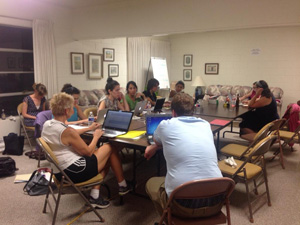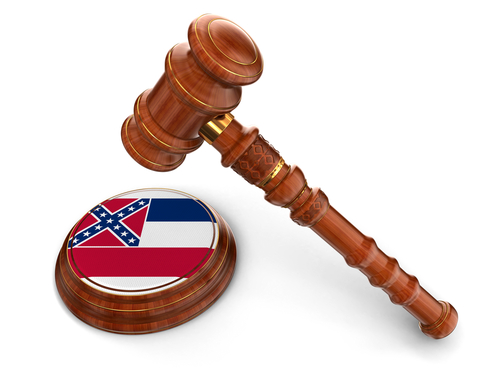Volunteer attorneys allege due process violations at immigrant detention center

AILA attorneys discuss case strategy at Artesia.
Image courtesy of Laura Lichter.
Attorneys volunteering their services to detained immigrant families allege that the federal government is violating due process in order to deport clients more quickly.
The Houston Chronicle reported yesterday that advocates are calling the family detention center in Artesia, New Mexico, a “deportation factory.” According to Vox, attorneys volunteering at the Artesia center are complaining about multiple due-process violations by immigration judges and Immigration and Customs Enforcement officers.
“It is the original due-process nightmare,” Laura Lichter, a volunteer attorney, told the ABA Journal.
Lichter, who normally practices immigration law in Denver, is part of a group of volunteers from the American Immigration Lawyers Association, which is coordinating pro bono representation in Artesia. The detainees they’re trying to help are part of the “surge” of immigrants fleeing violence in Central America. While much attention has been focused on unaccompanied minors, there has also been an increase in adults (mostly women) with small children. To handle that increase, the federal government set up the temporary facility at a law-enforcement training center in Artesia. As of Aug. 1, another has also been established outside San Antonio.
The AILA attorneys complain that immigration judges won’t let them speak for Artesia detainees in hearings, or meet with them beforehand, leaving them little ability to help their clients. They also argue that “textbook” asylum claims are being denied, and that judges are not explaining the legal basis for their rulings.
“We’re catching cases literally sometimes just a few hours before deportation and saying ‘Oh my God, you missed this,’” said Lichter, a past president of AILA. “And we’re getting those cases reopened, but only because frankly we’ve got a superhuman cadre of volunteers down here.”
Furthermore, volunteers say, the time before a hearing has been sped up so much that attorneys have about two weeks to make a case for asylum—a difficult task when the client’s available hours are limited by being in detention. No detainees are being released, the attorneys say, even when they normally would be.
Outside of court, attorneys are complaining that ICE, which runs the Artesia facility, changed its rules to prevent attorneys from bringing computers and other office technology into the facility. (The rules originally also banned smartphones, but this was relaxed under protest.) Because attorneys have to spend all day at the facility, they say, this severely limits their ability to work. And they say asylum officers and Customs and Border Patrol officers are asking questions that weaken the case for asylum.
“What we are seeing is that the government clearly—and there is absolutely no doubt about this, because it is basically what they have stated in bond proceedings—the government’s position is that in order to stem the tide of refugees… [it has] decided that they are not refugees, they are economic migrants, and that they must be returned with all due speed to their home countries,” Lichter said.
Susan Timmons of AILA told the ABA Journal that the problems in Artesia are complicated by the facility’s remoteness: It’s three hours from El Paso and almost four hours from Albuquerque. Timmons says no regional charities offer direct pro bono representation to immigrants. (That’s important in immigration, because people facing deportation are not entitled to public defenders.)
“Not only is there no game in town, there’s no game three hours away that is providing any type of direct services,” she says. “So if AILA members had not decided to go down there on their own dime, there would literally be no service providers at all.”
In the video below, attorneys describe their experiences at Artesia:
Artesia Day 4 from stephen manning on Vimeo.
Write a letter to the editor, share a story tip or update, or report an error.


